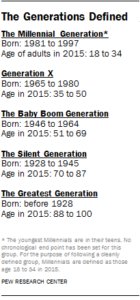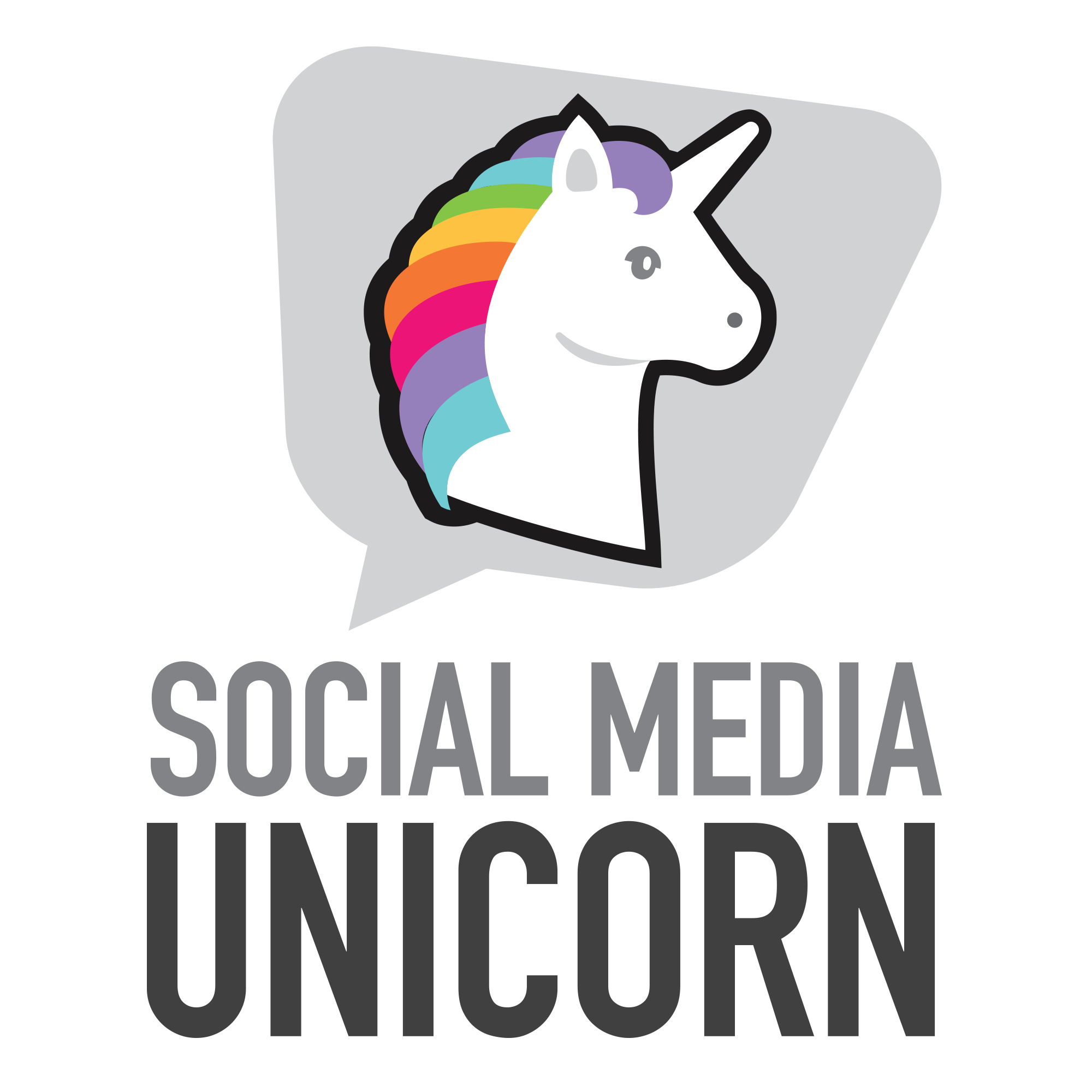Generational Marijuana Marketing: Is it all about the Millennials?
 According to the Pew Research Center 63% of Republican Millennials support the legalization of marijuana. Support for marijuana legalization is a largely generational story, with younger Americans on both sides of the aisle supporting legalization, while the older generations tend to be less likely to support marijuana legalization. Young adults have disproportionately driven the shift toward public support of marijuana, though support is rising among other generations as well. Millennials- those ages 18 to 35 in 2016- are more than twice as likely to support legalization of marijuana as they were in 2006 (71% today, up from 34% in 2006), and are significantly more likely to support legalization than other generations. It’s interesting because in Nevada, where medical marijuana is legal and the majority of Nevadans support the legalization of recreational marijuana for adults 21 and older, the majority of medical marijuana card holders are members of the Silent Generation. Seniors account for 57% of Nevada medical marijuana card holders (as of September 30, 2016). Young adults have disproportionately driven the shift toward public support of marijuana, though support is rising among other generations as well. Millennials- those ages 18 to 35 in 2016- are more than twice as likely to support legalization of marijuana as they were in 2006 (71% today, up from 34% in 2006), and are significantly more likely to support legalization than other generations. Where does this leave marijuana brands when it comes to marijuana marketing? The savviest cannabis brands understand the unique differences in characteristics and influences for each generation. Here is a breakdown of those differences: The Baby Boom Generation (52-70yr olds) Characteristics: Experimental, individualist, free-spirited, self-believing, self-fulfillment, self-improvement, rejection or redefinition of traditional values. Influences: The rise of television, the assassinations of JFK and MLK, the Civil Rights Movement, the Beatles, the Vietnam War, the Apollo moon landing, and Woodstock. Generation X (36-51yr olds) Characteristics: Rebellious, innovator, independent, entrepreneurial, anti-establishment, skeptical, ecologically-minded, anti-consumerist, short attention span, multi-career minded. Influences: Watergate, 70’s oil prices, Iran hostage crisis, increased divorce rates, rise of technology with personal computers, AIDS, and grunge music. Millennials (18-35yr olds) Characteristics: Style savvy, tech savvy, making more money at younger ages, independent, socially and environmentally aware, pro-community, multicultural, pro gender equality. Influences: Fall of Berlin Wall, birth of the internet, dotcom boom and bust, 9/11, social media growth, and rebirth of pop culture. Knowing these characteristics and understanding the influences of each generation can help marijuana brands to understand how to best connect, engage, and activate their target audience. As any Millennial can tell you, they are least likely to speak with someone on the telephone. In fact, there are memes making fun of brands who try to connect with them via telephone rather than through social media channels or a text message. So where does this leave marijuana brands that need to find an effective marketing strategy that satisfies these three different generations? The answer is to start developing an omni-channel marketing strategy. Omni-channel communication is the conversations between businesses and their customers that flow freely in both directions across multiple channels. The benefits of having multiple channels allows customers multiple options for connecting to your marijuana brand: by phone, on social media, through your website, e-mail, or text messages means more communication. More communication means more business, which can translate into more sales and higher profits for your marijuana brand. With the shorter attention spans of Generation X and Millennials, time is certainly the most important factor when dealing with marijuana brands. By responding quickly to customers in the channel of their choice, marijuana brands are showing that they are readily available to answer their questions. This is also removing the potential frustration that customers may experience when trying to contact a marijuana brand. This is why Facebook has an emphasis on the response time to Facebook Business Page messages. Response time drives your organic content algorithm, so if you want your content to be seen by more people who have liked your Facebook page having a 100% reply rate within 60 minutes is imperative. Omni-channel marketing is only going to grow in importance for marijuana marketing. If a marijuana brand is not agile and listening across multiple channels, they are ignoring a lot of their current and potential consumers. With Millennials getting older and making more money they are a huge part of the marijuana customer base. It is important to meet their needs and communication preferences if your marijuana brand wants to accomplish growth goals. In the past I would hear the same question from traditional CEO’s of major brands “What is the value of a tweet?” It’s simple: it is the same value of having a salesperson on the floor of your dispensary communicating the unique value proposition of your marijuana brand. If a Millennial prefers to communicate via Twitter, the value of that tweet is the difference between becoming a raving fan, a satisfied consumer, or a spurned potential consumer who found your marijuana brand to be deaf. Millennials are the largest generation since Baby Boomers, and they are a force to be reckoned with when it comes to their spending dollars and the ability to cause major chaos to a marijuana brand when their needs aren’t met. They have extremely high standards when it comes to customer service because they were raised on the internet and mobile technology has meant instant communication at any time. For marijuana brands it isn’t all about Millennials, but about creating omni-channel marketing approaches that connect on a deeper level with the cannabis consumer. After all, content is king, but emotion is queen.
According to the Pew Research Center 63% of Republican Millennials support the legalization of marijuana. Support for marijuana legalization is a largely generational story, with younger Americans on both sides of the aisle supporting legalization, while the older generations tend to be less likely to support marijuana legalization. Young adults have disproportionately driven the shift toward public support of marijuana, though support is rising among other generations as well. Millennials- those ages 18 to 35 in 2016- are more than twice as likely to support legalization of marijuana as they were in 2006 (71% today, up from 34% in 2006), and are significantly more likely to support legalization than other generations. It’s interesting because in Nevada, where medical marijuana is legal and the majority of Nevadans support the legalization of recreational marijuana for adults 21 and older, the majority of medical marijuana card holders are members of the Silent Generation. Seniors account for 57% of Nevada medical marijuana card holders (as of September 30, 2016). Young adults have disproportionately driven the shift toward public support of marijuana, though support is rising among other generations as well. Millennials- those ages 18 to 35 in 2016- are more than twice as likely to support legalization of marijuana as they were in 2006 (71% today, up from 34% in 2006), and are significantly more likely to support legalization than other generations. Where does this leave marijuana brands when it comes to marijuana marketing? The savviest cannabis brands understand the unique differences in characteristics and influences for each generation. Here is a breakdown of those differences: The Baby Boom Generation (52-70yr olds) Characteristics: Experimental, individualist, free-spirited, self-believing, self-fulfillment, self-improvement, rejection or redefinition of traditional values. Influences: The rise of television, the assassinations of JFK and MLK, the Civil Rights Movement, the Beatles, the Vietnam War, the Apollo moon landing, and Woodstock. Generation X (36-51yr olds) Characteristics: Rebellious, innovator, independent, entrepreneurial, anti-establishment, skeptical, ecologically-minded, anti-consumerist, short attention span, multi-career minded. Influences: Watergate, 70’s oil prices, Iran hostage crisis, increased divorce rates, rise of technology with personal computers, AIDS, and grunge music. Millennials (18-35yr olds) Characteristics: Style savvy, tech savvy, making more money at younger ages, independent, socially and environmentally aware, pro-community, multicultural, pro gender equality. Influences: Fall of Berlin Wall, birth of the internet, dotcom boom and bust, 9/11, social media growth, and rebirth of pop culture. Knowing these characteristics and understanding the influences of each generation can help marijuana brands to understand how to best connect, engage, and activate their target audience. As any Millennial can tell you, they are least likely to speak with someone on the telephone. In fact, there are memes making fun of brands who try to connect with them via telephone rather than through social media channels or a text message. So where does this leave marijuana brands that need to find an effective marketing strategy that satisfies these three different generations? The answer is to start developing an omni-channel marketing strategy. Omni-channel communication is the conversations between businesses and their customers that flow freely in both directions across multiple channels. The benefits of having multiple channels allows customers multiple options for connecting to your marijuana brand: by phone, on social media, through your website, e-mail, or text messages means more communication. More communication means more business, which can translate into more sales and higher profits for your marijuana brand. With the shorter attention spans of Generation X and Millennials, time is certainly the most important factor when dealing with marijuana brands. By responding quickly to customers in the channel of their choice, marijuana brands are showing that they are readily available to answer their questions. This is also removing the potential frustration that customers may experience when trying to contact a marijuana brand. This is why Facebook has an emphasis on the response time to Facebook Business Page messages. Response time drives your organic content algorithm, so if you want your content to be seen by more people who have liked your Facebook page having a 100% reply rate within 60 minutes is imperative. Omni-channel marketing is only going to grow in importance for marijuana marketing. If a marijuana brand is not agile and listening across multiple channels, they are ignoring a lot of their current and potential consumers. With Millennials getting older and making more money they are a huge part of the marijuana customer base. It is important to meet their needs and communication preferences if your marijuana brand wants to accomplish growth goals. In the past I would hear the same question from traditional CEO’s of major brands “What is the value of a tweet?” It’s simple: it is the same value of having a salesperson on the floor of your dispensary communicating the unique value proposition of your marijuana brand. If a Millennial prefers to communicate via Twitter, the value of that tweet is the difference between becoming a raving fan, a satisfied consumer, or a spurned potential consumer who found your marijuana brand to be deaf. Millennials are the largest generation since Baby Boomers, and they are a force to be reckoned with when it comes to their spending dollars and the ability to cause major chaos to a marijuana brand when their needs aren’t met. They have extremely high standards when it comes to customer service because they were raised on the internet and mobile technology has meant instant communication at any time. For marijuana brands it isn’t all about Millennials, but about creating omni-channel marketing approaches that connect on a deeper level with the cannabis consumer. After all, content is king, but emotion is queen.
Are you a marijuana brand looking for fast-growth in an ever-changing marketplace? Social Media Unicorn has unicorns on the ground in Denver, Seattle, Las Vegas, Phoenix, and Los Angeles ready to help you with your marijuana branding, digital marketing, and social media needs. Give us a call or text at 702-812-6555 to start the conversation NOW!









The world changes so fast. I don’t see how an 18-year-old today is the same as a 36-year-old in anything that defines who they are. Today we have psychographics data that is more accurate.
Forrester calls “Millennials” as psychographic trait., defining the digital first, adaptable beings we’re all becoming. I’m personally much more open to legalization today than when I was 20. I’m not who I was at 20, 40, or even 50.
Your post is valuable , thanks for the info http://myhealthandwellness.pen.io
I think this is a real great blog post.Much thanks again. Great.
Very neat blog post.Really thank you! Really Cool.